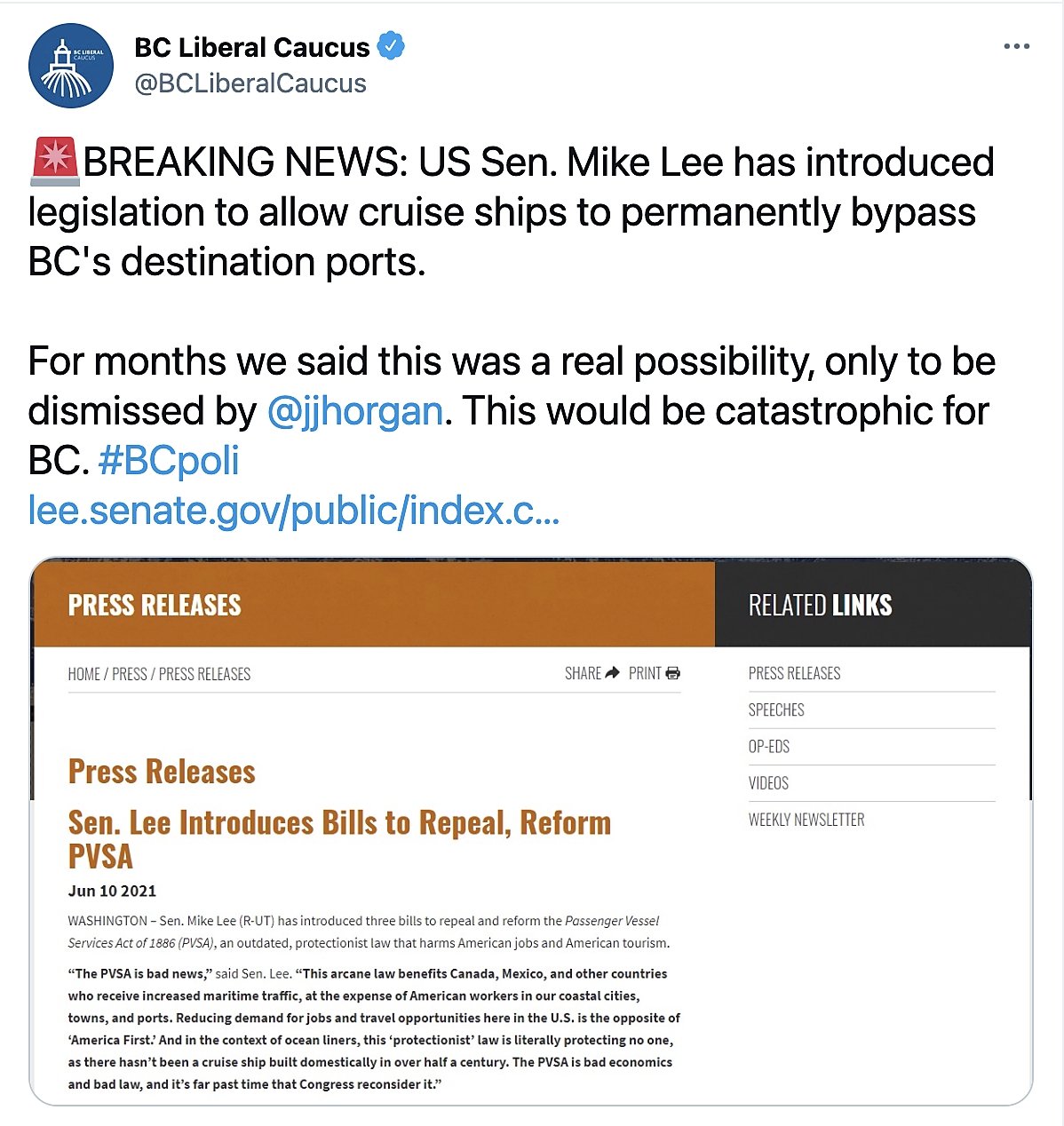Last month Sen. Mike Lee leveled some richly deserved criticism at the Passenger Vessel Services Act (PVSA), an 1886 law restricting the domestic waterborne transportation of passengers to vessels that are U.S.-flagged, U.S.-built, and mostly U.S.-crewed and owned. Now the Utah Republican has decided to turn his words into action, introducing three pieces of legislation taking aim at the 135-year-old law. These bills are:
- Open America’s Ports Act: This bill would repeal the PVSA.
- Protecting Jobs in American Ports Act: This bill would repeal the PVSA’s U.S.-built requirement.
- Safeguarding American Tourism Act: This bill would exempt large passenger vessels—defined as those with 800 or more passenger berths—from PVSA requirements.
On pure policy grounds, repeal of the PVSA—as the Open America’s Ports Act does—is the ideal outcome. Ridding the United States of the law would, through its introduction of lower costs and increased competition in the cruise industry, help energize tourism along the country’s coasts, Great Lakes, and numerous rivers among other salutary effects. But as has been shown with the Jones Act, the outright repeal of protectionist U.S. maritime laws is no easy task.
Short of repealing the PVSA, meanwhile, the Protecting Jobs in American Ports Act’s elimination of its U.S.-built requirement would be the most powerful means of mitigating the law’s harm. The few cruise vessels built in this country are far more expensive than those built abroad, reflecting U.S. shipyards’ woeful lack of competitiveness. Viking River Cruises, for example, discovered that building PVSA-compliant vessels in the United States would cost twice as much as building them in Europe. Those costs are inevitably passed along to consumers, diminishing the appeal of the cruise and passenger transport industries.
Some types of shipbuilding are so uncompetitive that they simply don’t take place. No large cruise ships—those with at least 800 passenger berths—have been built in a U.S. shipyard since 1958. This makes the Safeguarding American Tourism Act a sensible reform, as it would essentially eliminate protectionism for non-existent large cruise ship construction and a type of ship operation that consists of a single vessel, the Hawaii-based Pride of America (a ship that was actually built in Germany but is allowed to operate under the PVSA thanks to a fierce lobbying campaign).
That’s not to say large cruise ships can’t be found in the United States. Flying foreign flags, such vessels regularly ply U.S. waters and visit the country’s ports without violating the PVSA provided they also include a foreign stop in their itinerary. Sparing such ships from the PVSA would eliminate this need to visit foreign ports, allowing a greater focus on U.S. tourism.
That’s got some foreigners nervous. Under the status quo, large cruise ships operating between Seattle and Alaska invariably stop in Canadian ports to avoid running afoul of the PVSA. That’s a boon to Canada, with each ship visit to Vancouver generating $3 million in economic activity according to one estimate. And now there is mounting worry that Sen. Lee’s latest efforts could bring this PVSA-induced gravy train to a screeching halt.
British Columbia’s Minister of Transportation and Infrastructure described the proposed legislation as “of greater concern to British Columbia and Canadians” while the British Columbia Liberal Caucus labeled the bills “catastrophic” in a recent tweet:
That the loudest outcry over Sen. Lee’s proposal to pare back the PVSA’s restrictions has erupted abroad provides a revealing insight into just who this law is benefitting. That out to help provide the impetus for action.
So do these bills have a shot at passage? While the repeal bill is almost certainly out of the question, Congress has proven willing in the past to enact some tepid reforms of the law. The Puerto Rico Passenger Ship Act of 1984, for example, exempted passenger travel between Puerto Rico and other U.S. ports from the PVSA so long as no U.S.-flag ship is available. More recently, meanwhile, Congress passed by unanimous consent—and President Biden signed into law—the Alaska Tourism Restoration Act which effectively exempted cruise ships from the PVSA so long as Canadian ports remain closed to such vessels due to COVID-19 concerns.
If Congress is willing to temporarily exempt cruise ships operating in Alaska from the PVSA, why not do so permanently? How is the forced diversion of these ships to Canadian ports sensible policy? And why not extend the ability to skip foreign ports to the entire country rather than just the Alaska cruise industry?
Senator Lee has served up an enticing menu of options for paring back maritime protectionism that would help unleash the country’s economic potential, especially in the tourism sector. Let’s hope these bills are given the consideration they clearly warrant.

